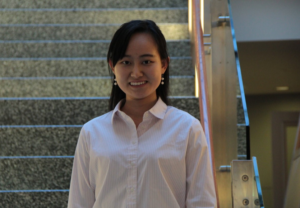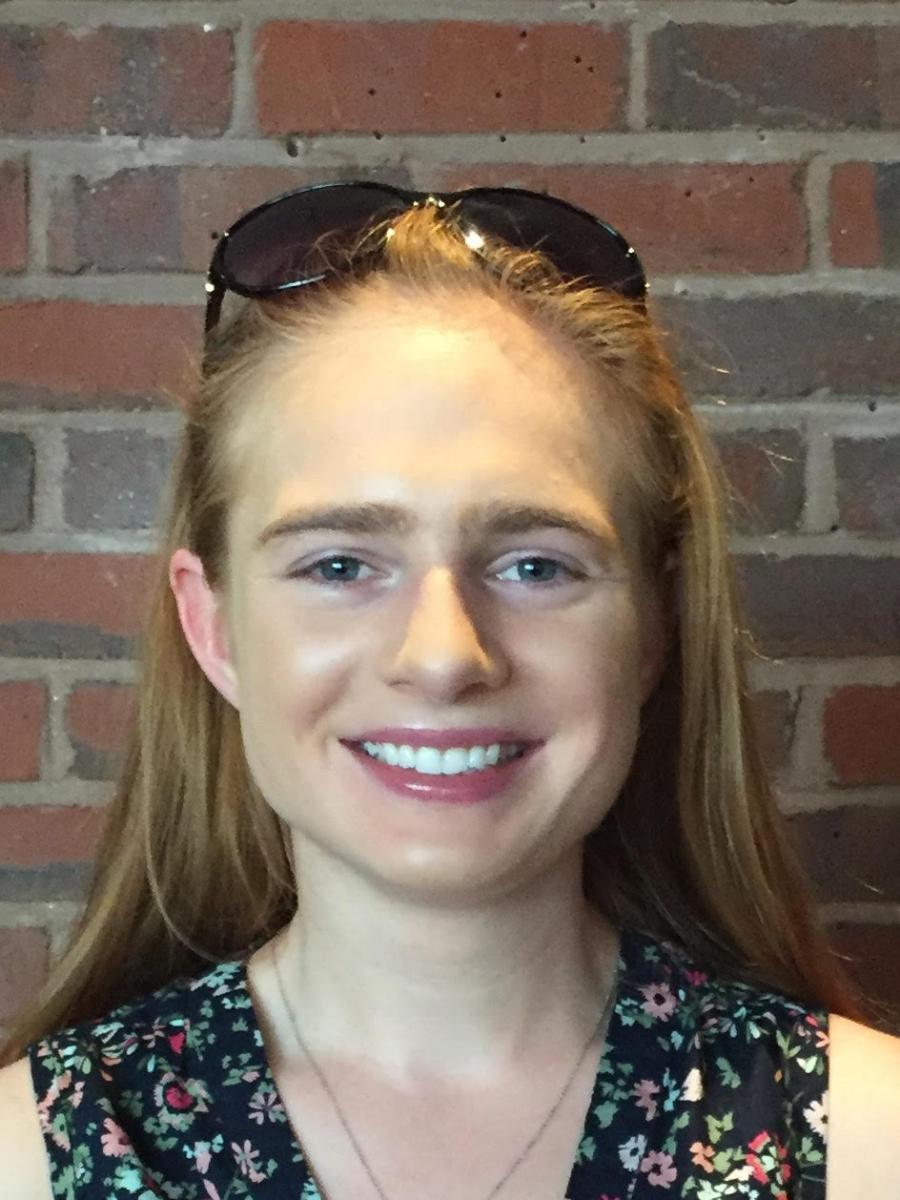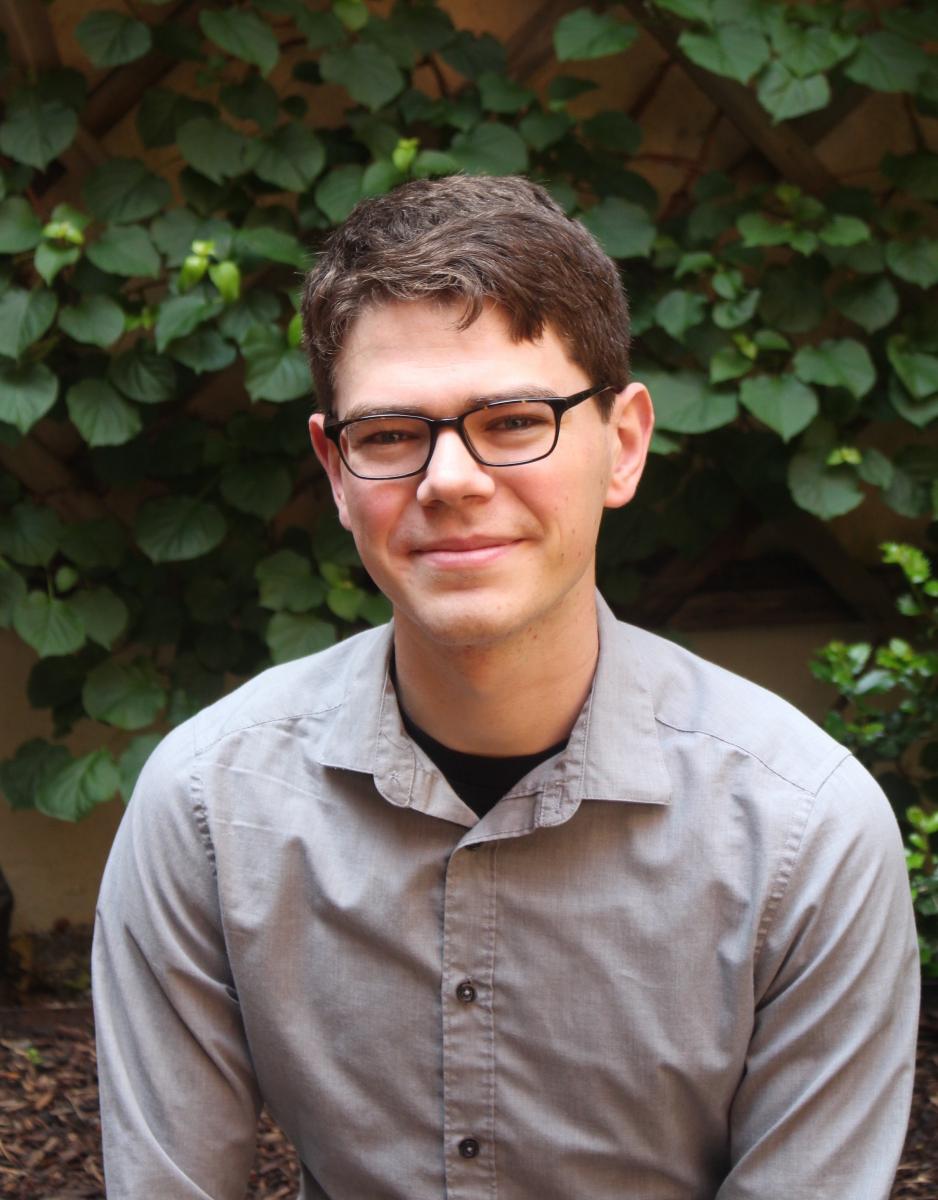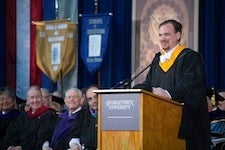Georgetown History Alumni
In recent years, History majors have pursued with success a great variety of careers: many have attained graduate degrees, in all areas and fields; their occupations range from finance to education, from politics to medicine, from law and law enforcement to retail, and many more.
A LinkedIn search of Georgetown alumni who studied History and graduated between 2000 and 2014 yields this information:
The top employers include Georgetown University and its Law Center, the U.S Departments of State, Justice, and Defense, the U.S. Army and navy, Booz Allen Hamilton, the U.S. House of Representatives, and Deloitte.
The top occupations listed are: legal, research, media/communications, education, administrative, consulting, operations, program/project management, finance, marketing.
Similar patterns apply to History majors (in both College and SFS) who graduated in 2014: their employers range from Deloitte to Teach for America, from the Department of State to theater companies, from Dropbox to NBC. Others are attending law or graduate school at Yale, Virginia, Boston University, NYU, Edinburgh, or Oxford.
And here are a few words from a handful of alumni from the last 15 years or so who have kindly agreed to share their thoughts about their experiences with the History major:
Xinlan Hu, COL 2018

I set my mind on majoring in History even before coming to Georgetown out of a love for stories and for uncovering buried facts about the past, but I have gained a new appreciation for the value of studying History in my four years at Georgetown.
Not only did I learn so much about the American society of today through my regional concentration in the United States, specifically its Cold War era, but I also gained exposure to foreign cultures through my classes on modern Japan and on film and women in South Asia. I wrote my senior thesis on the interplay between the Sino-U.S. rapprochement of 1971-1972 and domestic politics in both countries and I was truly excited to research the beginning of an important bilateral relationship that was personally significant for me as an international student from China.
The value of my History major extends beyond the knowledge and perspectives I gained to writing and research skills applicable to the professional world. Interning as a credit research analyst at Bank of America Merrill Lynch over the past summer, I was able to create a more persuasive bond pitch by drawing on my experience writing primary research papers for History. Having gone through all those seminar discussions, I have also become more articulate of my opinions and more comfortable with critical reading. Thank you to all my History professors at Georgetown for an academic experience that far exceeded my expectations!
Annette Russell, COL 2016

During the fall of 2016 I began to substitute teach at several schools in the DC Metro Area. I covered everything from 1st grade through AP-level classes, and in all subjects. I sought a job teaching middle school History but wanted to log as many hours in the classroom as possible. After I graduated in December 2016, I continued to sub through the spring and found a job at Nysmith School for the Gifted in Herndon, VA, teaching 2nd and 3rd grade Social Studies. My love of History dates from that age or earlier, and I am excited about being able to teach a combination of American and Ancient History. Although I find middle school a particularly interesting age academically (for one thing, students demand that there be a good reason for all efforts they exert), it may not be a bad thing to begin by teaching a grade level less fraught with social tensions.
I was a History major and Medieval Studies minor at Georgetown, and I intend to steer my career toward a job teaching Medieval History, if possible. I worked and studied on and off during my time at Georgetown, so I had plenty of time to figure out what I actually wanted to do professionally and to discover how I wanted my academic life to continue after graduation. I have not ruled out graduate school, but for now working has been a welcome change from studying.
I spend a good deal of time trying to explain what appeals to me about the Middle Ages but enjoy tackling that question. Understanding how that era was a different world, despite people being people across the centuries, is a problem I expect to spend my whole life trying to answer. I welcome the challenge! I feel very fortunate to have found a discipline and career path that will allow and encourage me to continue learning throughout my life. Thank you, fabulous Georgetown professors, for encouraging that mindset!
Michael Donnay, COL 2016

As an undergraduate at Georgetown, I focused on institutional cultures and the impact of those cultures on organizational developments. This let me combine my dual passion for history and theater in a number of exciting ways. Through particular courses, internships, and personal research I got to explore institutions as varied as the Continental Navy, nineteenth-century surveying programs in Argentina, and sixteenth-century missionary networks. At the same time, I actively helped guide and support the theater institutions on campus as a stage manager and technical director.
During my senior year, I served as the Executive Producer of the Mask & Bauble Dramatic Society while writing an honors thesis. My topic, the organization of American Jesuit colleges in the late nineteenth century, allowed me to dive deeply into a host of interpersonal dynamics that were very similar to the challenges I faced in theater. I was constantly surprised at how readily the things I learned in my research transferred to my work with Mask & Bauble and vice versa – often in delightfully unexpected ways!
Since graduating I have been pursuing stage management. The year after graduation, I worked as a stage management apprentice at the Actors Theatre of Louisville (where I worked with another Georgetown history grad who is now a playwright). As I continue to pursue theater professionally, I am constantly relying on the skills I learned as a history major and on the support of my faculty mentors, who encouraged my dual paths.
Steven Piccione, COL 2013

Since graduating in mid-2013, I worked as a production assistant for NBC’s “Saturday Night Live,” where I had already interned during my junior year. Since moving back to DC in January 2014, I’ve worked in marketing for two companies. During the workweek, I’m a social media analyst and copywriter at Pulsar, a digital marketing agency here in Washington, D.C. My position at Pulsar requires critical thinking, research, sharp writing, and the ability to identify trends. During weeknights and weekends, I am the Media Manager for my family’s vineyard and winery, which entails building and maintaining the main website, overseeing all social media, coordinating and planning special events with neighboring vineyards, and working with freelance artists for creative-based projects.
Having a degree in history has helped me adapt to an increasingly competitive and changing postgraduate world. Learning to think like a historian is an asset to virtually every industry, from academia and entertainment media to marketing and finance. My studies at Georgetown have taught me to think critically about myself and the world. Never underestimate the value of being able to read, write, and think critically, which every course in history demands of and teaches its students.
Taylor Lescallette, SFS 2012

My interest in the history of World War II led me to apply for an internship at the U.S. Holocaust Memorial Museum in Spring of my freshman year. I was placed in the development department, which was responsible for private fundraising. I worked there for the rest of my time at Georgetown, assisting the fundraisers in planning events and corresponding with donors. My time at the Museum allowed me to learn from accomplished scholars of Holocaust history, to hear from survivors first hand, and to gain valuable career skills in nonprofit fundraising.
Currently I work as a research analyst in the Office of Advancement at the Smithsonian Institution, where I research current and prospective donors. I use the analytical skills that I honed in my GU history courses every day as I gather and synthesize complex information on donors’ assets, philanthropic giving, and personal backgrounds. Through this work I support the development and funding of fascinating projects that indulge my love of history, such as the brand-new National Museum of African American History and Culture (opening 2015) and the Smithsonian Asian Pacific American Center, to name a few.
Vanessa Washington, COL 2008

After graduating from Georgetown University in 2008 with a B.A. in History, I began an exciting career as an assistant buyer for Bloomingdale’s in New York City. Though I enjoyed the position, I soon realized that I wanted to pursue a career in public service where my work would have a lasting social benefit. To make the transition, I began a part-time graduate program at John Jay College of Criminal Justice in order to pursue a Master of Public Administration degree. The graduate program led me to my current position as an Unemployment Insurance Investigator for the New York State Department of Labor’s Office of Special Investigations. In this role, I conduct investigations into complex cases of alleged unemployment insurance fraud by claimants or employers. Our cases often result in referrals to law enforcement and local District Attorneys for criminal prosecution.
Earning a B.A. in History has greatly benefitted me in my current position, which is writing-intensive. Having a background in history has allowed me to extrapolate the relevant facts from large amounts of information and summarize crucial points in comprehensive investigation reports. Furthermore, the investigative process is much like conducting thorough historical research and analysis. An investigator must be skilled at obtaining and verifying evidence through various sources and drawing conclusions supported solely by the facts. Once a case is concluded, I am often required to testify as a witness in Grand Jury and administrative proceedings. In these instances, reporting the facts with accuracy and explaining how I arrived at my conclusions is of paramount importance. Often, I am tasked with explaining a case to grand jurors who are unfamiliar with State unemployment insurance laws, so my ability to successfully “connect the dots” in my testimony will likely yield a criminal indictment.
As I continue to advance in my career, I’m certain that the history degree will continue to serve me well.
Stephen Silvius, COL 2007

I graduated in 2007 summa cum laude with a double major in History and Mathematics. While in the department I was a member of Phi Alpha Theta. After Georgetown, I taught high school in Los Angeles, CA before attending Oxford on a Marshall Scholarship to study Education Research Methodology. I went on to co-found Three Ring, a Baltimore-based education technology startup. Currently, I work as a freelance education and technology consultant with a focus on early stage organizations. In 2014 I was the featured speaker at Senior Convocation (see photo). As a teacher, an academic, and an executive I have always relied on foundational skills built through the study of history. In particular, I believe that experience in qualitative research and analysis and the ability to construct and deconstruct narratives have been indispensable to my work in the business world.
Anne Heffernan, COL 2007

I came to Georgetown as a freshman in 2003 with a love of history but little idea of what to do with it, or even whether that would (or should) become my major. As an 18 year old I was enough of an idealist to want to study the things I loved, but also enough of a pragmatist to know I’d need a job someday. As it turns out, history at Georgetown enabled me to have both. Thanks to some fantastic professors and inspiring courses, history eventually became my major, my passion, and my career. The department’s emphasis on historical breadth as well as depth led me to take my first class in African history, with no background in the subject or continent. That class turned into a minor, and after graduation, that minor led me to do a Master’s degree in African Studies at the University of Oxford. From Oxford I returned to DC to work with the Africa Center for Strategic Studies, a US government agency that fosters partnerships and promotes engagement between the US and most of Africa’s 53 countries. My job enabled me to do short-term research, to collaborate with agencies at home and in partner countries, and to travel to parts of the world I never imagined I would see. It was exciting, and it proved to my family and friends that history majors are employable! After two years, though, I missed the opportunity to choose my own research agenda, and to invest myself in a subject and place for the long-term. That has brought me back to Oxford, where I’m completing my doctorate on South African history. Next month I will move to Johannesburg to take up a Mellon post-doctoral research fellowship and begin a new historical research project. I can’t wait.
I have no doubt that I wouldn’t be where I am now without the skills and training my history degree at Georgetown gave me; the ability to write clearly and concisely and to craft and defend an argument are invaluable in any field. But even more importantly, the historians who designed Georgetown’s curriculum and pushed me out of my comfort zone and into that first class on African history gave me something much more precious: inspiration. Ten years later, I’m still having an amazing time pursuing the dreams I first began to have there.
Jennifer Kasten, COL 2003

Uncertain what I wanted to do with my History degree after graduation, I took a job as Legal Assistant at a Washington law firm. In my spare time, I volunteered at the Washington Animal Rescue League and found my passion: caring for sick animals. In 2011, I obtained my DVM from the College of Veterinary Medicine at The Ohio State University. Since graduation, I have pursued advanced training in equine practice and anesthesia.
Although the links between history and the practice of veterinary medicine may not seem obvious, the basic skills learned in the History Department at Georgetown form the basis of my daily practice. The concept of analyzing and interpreting facts from an often complex and fragmented story is essential to making diagnostic and treatment plans for my patients. The communication, critical thinking and reading skills that were learned during discussion groups are used daily in rounds and journal club. The literature searching techniques I acquired while workings on my honors thesis are used on a near daily basis, both to inform my clinical practice, as well as my research. The writing skills I developed under the direction of my professors at Georgetown are fundamental to my job as a veterinarian. I write medical records, discharge summaries, research abstracts, and journal articles. All of these tasks are easier because I am so comfortable writing. Outside the hospital, history has now become a big part of my favorite hobby: exploring the world.
Anthony House, COL 2002

I was a late arrival to Georgetown’s History Department. When I arrived on the Hilltop for my freshman year I joined the McDonough School of Business. By the end of the first semester I found myself missing the intellectual rigor of the humanities. I began the process of transferring to the College, with my eye on a major in History. I pursued the honors program, and enjoyed writing my thesis on the goals and impact of the 1753 reform of English marriage law so much that I decided to continue studying history at the graduate level. I was lucky enough to head to Oxford, where my doctoral thesis focused on the effects of English property law on the fate of church land in the century following the Reformation. After finishing my doctorate, I joined Google’s communications team.
The critical thinking and writing skills I developed by studying history have served me incredibly well at Google, even if I now measure my written output in hundreds (rather than tens of thousands) of words. I currently lead Google’s European public policy strategy team. In retrospect, both my professional and academic careers have hinged on thinking about the unintended consequences of laws, but I also benefit from the intellectual toolkit that studying history furnished for me: being able to read critically, absorb new information with an eye to its source and the factors that affected its creation, and develop robust opinions and arguments. These are skills that are invaluable in the knowledge economy, and I am grateful for the teachers and academic programs that helped me develop them.
